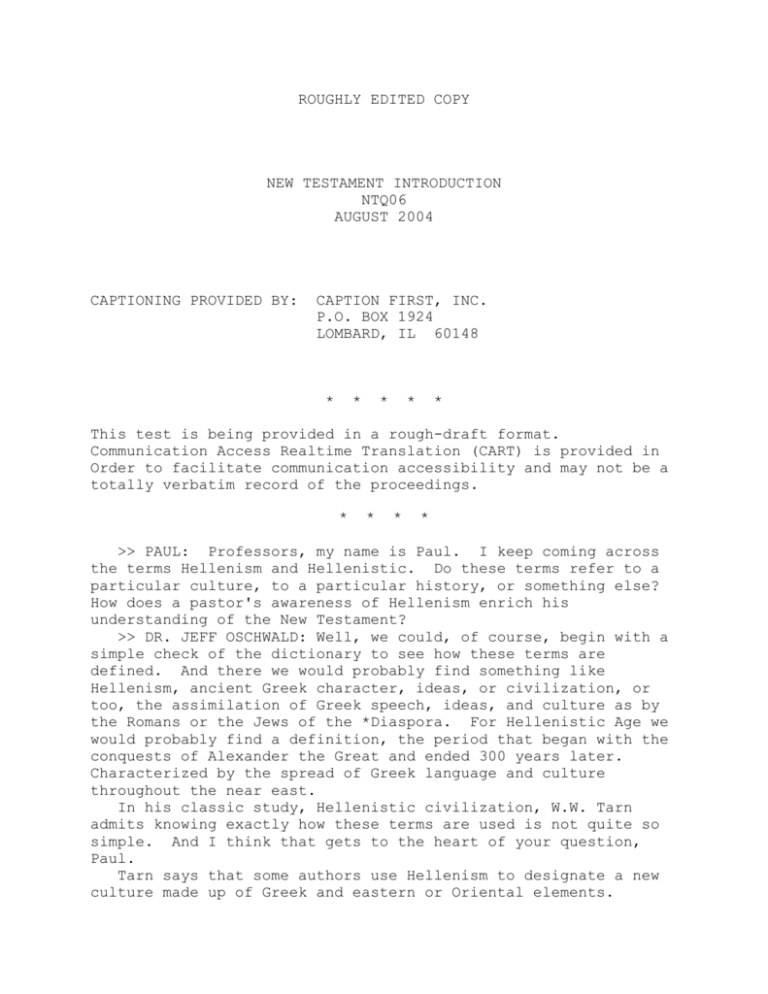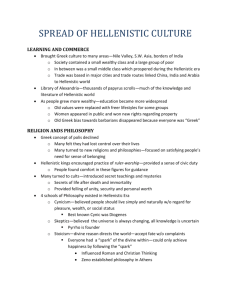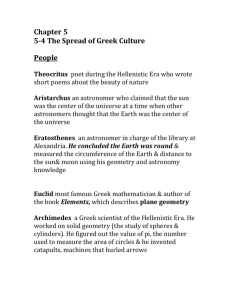ROUGHLY EDITED COPY
advertisement

ROUGHLY EDITED COPY NEW TESTAMENT INTRODUCTION NTQ06 AUGUST 2004 CAPTIONING PROVIDED BY: CAPTION FIRST, INC. P.O. BOX 1924 LOMBARD, IL 60148 * * * * * This test is being provided in a rough-draft format. Communication Access Realtime Translation (CART) is provided in Order to facilitate communication accessibility and may not be a totally verbatim record of the proceedings. * * * * >> PAUL: Professors, my name is Paul. I keep coming across the terms Hellenism and Hellenistic. Do these terms refer to a particular culture, to a particular history, or something else? How does a pastor's awareness of Hellenism enrich his understanding of the New Testament? >> DR. JEFF OSCHWALD: Well, we could, of course, begin with a simple check of the dictionary to see how these terms are defined. And there we would probably find something like Hellenism, ancient Greek character, ideas, or civilization, or too, the assimilation of Greek speech, ideas, and culture as by the Romans or the Jews of the *Diaspora. For Hellenistic Age we would probably find a definition, the period that began with the conquests of Alexander the Great and ended 300 years later. Characterized by the spread of Greek language and culture throughout the near east. In his classic study, Hellenistic civilization, W.W. Tarn admits knowing exactly how these terms are used is not quite so simple. And I think that gets to the heart of your question, Paul. Tarn says that some authors use Hellenism to designate a new culture made up of Greek and eastern or Oriental elements. Others use the term to designate the extension of Greek culture to Orientals, people living in the near east. Still, others use Hellenism to designate the continuation of that pure line of older Greek civilization. And finally, some use the term to denote a civilization modified by these new conditions. Tarn concludes that all of these theories contain a truth, but that none of them represents the whole truth. In the study of the civilization of this period, then, Hellenism becomes a convenient label for the civilization of the three centuries during which Greek culture radiated far from the homeland. No general definition will cover all of the phenomena that need to be taken into consideration as we look closer at these background centuries to the New Testament period. Although we really could properly divide this Hellenistic Age into two different periods, a beginning creative, or flourishing phase, and then a later phase when that creative impulse seems to have been exhausted. There are certain features of the age that are true throughout. Let me briefly summarize Tarn's description in this age, Tarn notes that the idea urges of inhabited world as a whole. A world that is the common possession of civilized men. For the use of this world there was developed a form of Greek that we know as Koine Greek, the common speech. At this time, Greek might take a man from Marseilles in France all the way to India, or from the Caspian Sea clear down to the cataracts of the Nile. Nationality falls into the background as this new-shared language, and the education that it made possible promote a new sense of a common culture in cities throughout the empire, regardless of what nation they're located in. Particularly, the upper classes in Rome and Asia come to feel that Greek culture is a thing that a man must have at least in external behavior. Commerce is also internationalized. Tarn says, "Thought is as free as it was not to be again until modern times." Now, here I suspect Tarn may be romanticizing a little bit. Morality is a matter of science and not a question of religious or social authority. The personality of the individual is also given free scope, and yet, it was an age when even in its most creative period it could not be said that every fruitful idea was Greek. This culture shows significant influence from people coming from these new areas of Greek influence. At the same time, and so that we don't begin to think too much in modern terms of this period Tarn remind us that it was a world empty of machines, but full of slaves. Although this narrow definition of the Hellenistic Age would not include the New Testament period proper, the lasting effects of this age continued long after the *Solusits were replaced by the Romans. For example in Acts 6 there is mention of Hellenistic Ages, a group of Christians who perhaps spoke only Greek and seemed to have been acculturated to Greco-Roman civilization. But more important than improving our ability to understand certain details of the New Testament is the way an understanding of the Hellenistic background of the New Testament shapes the thought world of many of the New Testament's characters. Especially significant from a conceptual point of view is the idea I just mentioned of one inhabited world, and the way that New Testament authors will both use and then transform this concept. In addition, we can see the gracious Providence of God ways and means for the spread of the Gospel of his son who at the right time was born of a woman, born to be our redeemer. * * * * * This test is being provided in a rough-draft format. Communication Access Realtime Translation (CART) is provided in Order to facilitate communication accessibility and may not be a totally verbatim record of the proceedings. * * * *








